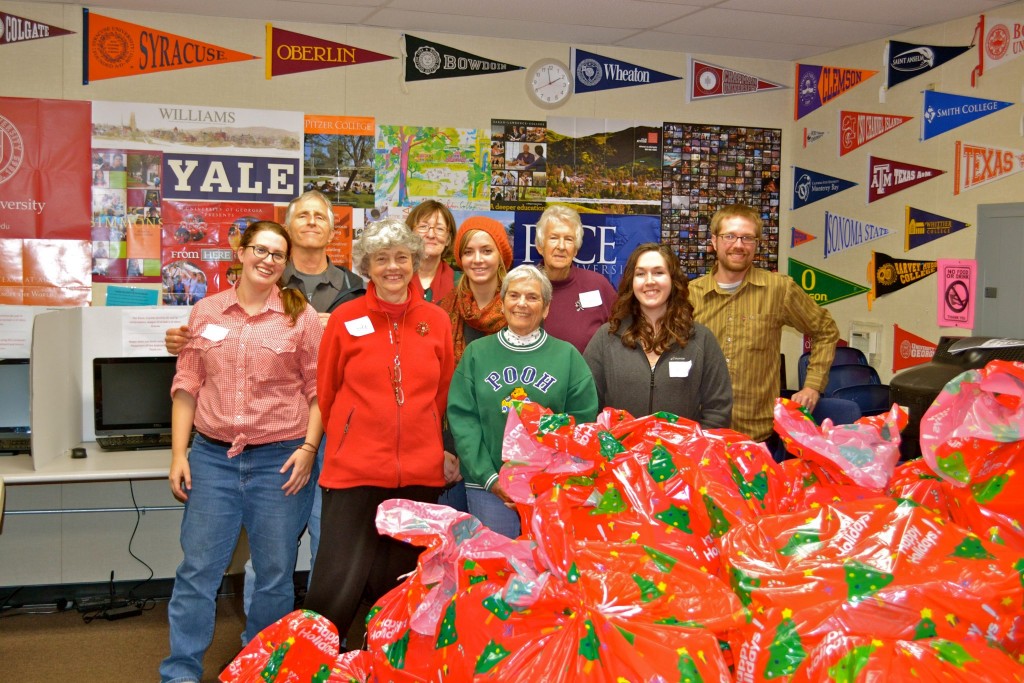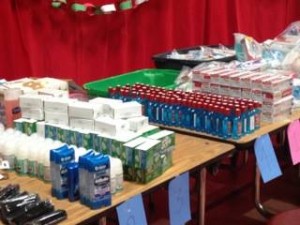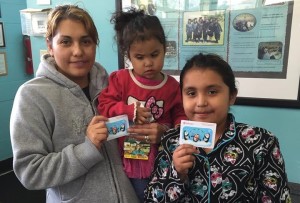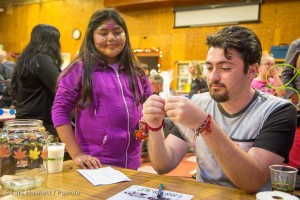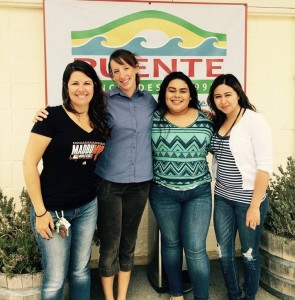One of the best parts of working at Puente for Abby Mohaupt, Volunteer Coordinator and Faith Community Liaison, is making the list of what South Coast community members will receive at the end of the year.
Between ESL graduation, the last Zumba class of December, Posada, La Sala Christmas, Homework Club celebration, the annual Hannukah party at the Pescadero Elementary School, and gift card distribution for families, Puente collects and gives away over 4000 items to close to 500 individuals and families. Pencils, backpacks, sleeping bags, socks, crayons, hoodies, towels, dreidels, puppets, and more—all get sorted into stockings and bags and boxes.
“It can be a little overwhelming to make that list and then think about collecting everything, but it’s also amazing to know that each item will be donated,” says Mohaupt. “We’ll make 125 stockings for children to get from Santa at Posada—and those stockings are filled with toys and books, as well as handmade scarves and school supplies.” In the past, the stockings have been packed by volunteers. This year students from San Mateo’s Serra High School will do the packing.
For Kerry Lobel, Executive Director, the stockings have a personal meaning. “One year, my mom said, ‘why not give every child a Christmas stocking?’ so we do!” she says. The stockings are given to children by Santa at Posada.
It’s not just children who receive things during the holiday season. For many years, Puente gave away bags of much-needed items to farmworkers. This year will mark the second year that participants in La Sala will have the opportunity to fill their own bags and boxes with what they’ll need for the year.
“In the past, we’ve had volunteers pack bags of toiletries, sweatshirts, tshirts and other things that we think farmworkers need. Last year we set up the multipurpose room in the elementary school so that each participant could pick what they wanted instead of what we think they needed,” Mohaupt remarks. Those volunteers have been invaluable to Puente and to the end of the year collection and distribution.
Rethinking La Sala’s Christmas experience let the men choose exactly what they wanted and needed—so some of the men took 5 deodorants and some took 1, some took 3 sweatshirts and some took 5 tshirts instead. Sleeping bags donated by Harvey Milk Academy in San Francisco were a big hit.
“It was a joyful sight to see workers fill up their own Christmas bags,” Ben Ranz, Puente’s Community Outreach Coordinator recalls. “That room was full of smiles! It was also educational for us – we learned that towels are a much hotter commodity than we realized, so we will be getting many more of those this year.”
This year also marks the second year that donations collection have been done through the online giving site, Roonga. The site lets donors buy specific items for Puente’s collection and at the end of the drive, all the donations arrive at Puente at the same time. This has cut down on donations taking up much-needed storage space and allows Mohaupt to easily track what Puente has and what still needs to be donated.
Even so, many committed and generous donors still want the experience of collecting real items. Members of Peninsula Metropolitan Community Church, just one of many faith communities who help with the end of the year drive, are collecting glue sticks, soap, shampoo, and hot wheels. Rev. Terri Echelbarger says that for her congregation, “the tangible part of ritually collecting supplies as a part of our worship directly connects our folks to Puente in an important way.” Members of the congregation will also volunteer at Puente’s December 18th Posada celebration.
Other donors prefer to put even more agency into the hands of participants. Since 2011 Puente has been giving gift cards to participants so that families could purchase the presents and food they wanted for the holidays. “Parents know exactly what their kids want and need, so we empower them to choose the way they celebrate,” says Lobel, “and buy what they want.”
Laura Rodriguez, Community Resource Navigator at Puente, is the person who calls families and registers them for gift cards. She says that “we want families to have a happy Christmas and by giving parents the tangible hope that they can provide for their families with these cards” we get to support the celebration.
One mother, who asked to remain anonymous, said, “With the gift cards that I receive for my children I purchase clothing for them since many times we do not have enough money. Thanks to Puente I am happy that I am able to give my children presents and make their Christmas special. The gift card that I receive for food, I buy food that is needed in my home.”
This year, Puente needs to raise $13,000 for those gifts cards to Mi Pueblo, Target, and Ross—which will be given to participants who sign up for them in increments of $50. Some of those cards will be donated by First Congregational Church of Palo Alto.
The rest of the $13,000 will be raised through Razoo on Giving Tuesday (December 1) and Puente staff are gearing up for a big day of fundraising. Donations can be scheduled ahead of time online or by contacting Patrick Letellier, Puente’s Development Director at pletellier@mypuente.org or by calling 650-262-4090.

